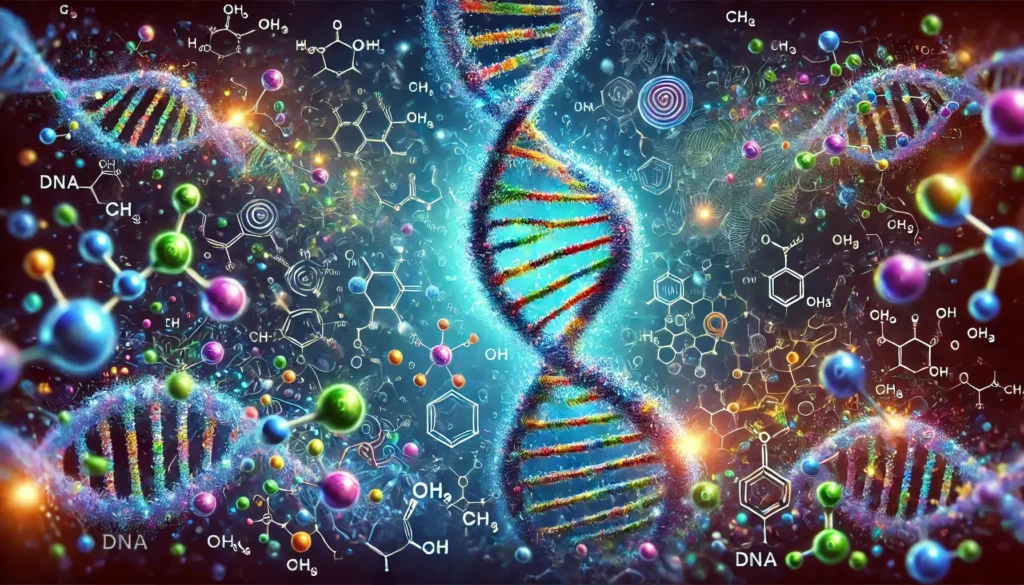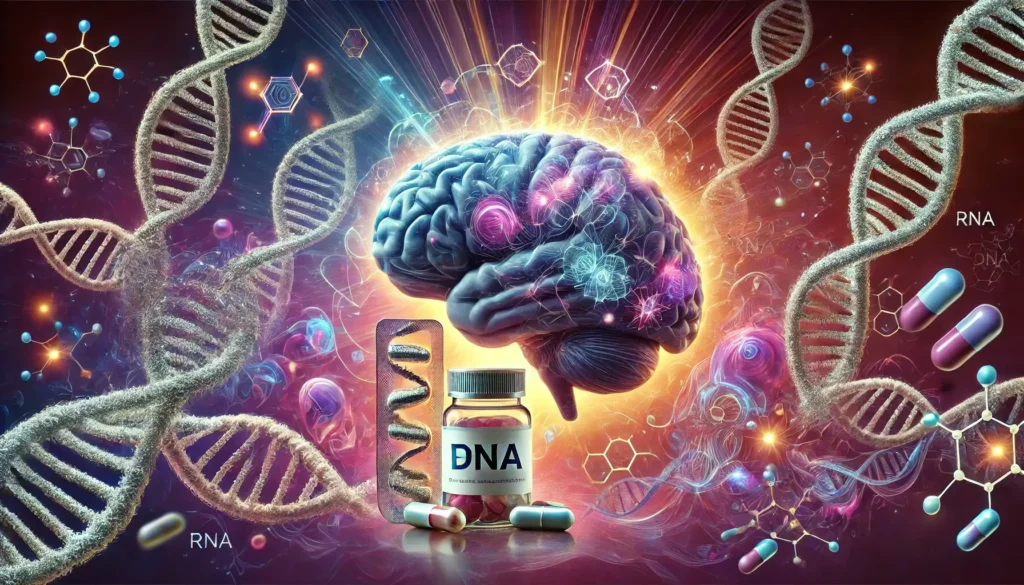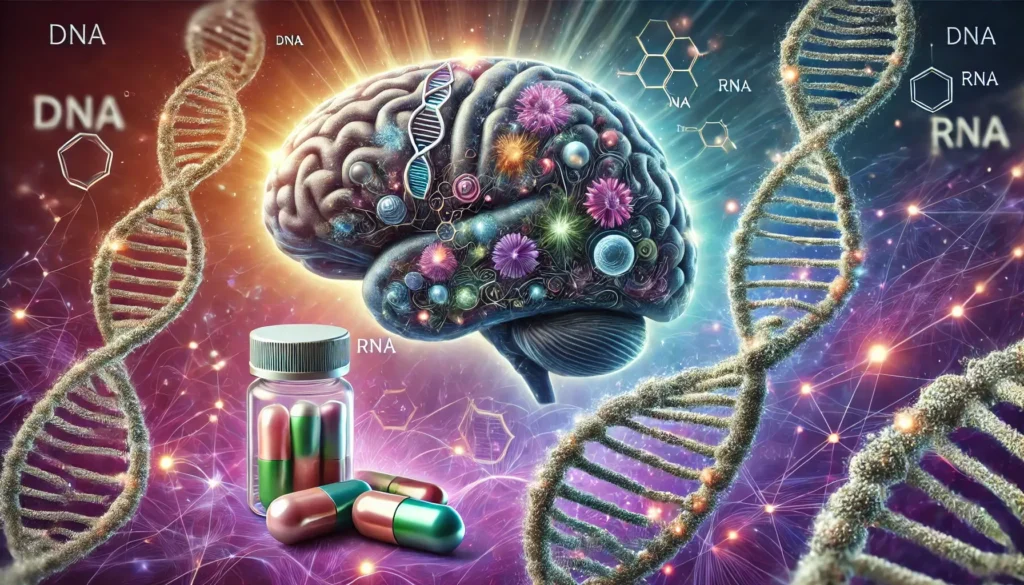The use of supplements for cognitive enhancement, or nootropics, has gained widespread popularity in recent years. Among the many substances being explored, RNA (ribonucleic acid) and DNA (deoxyribonucleic acid) supplements are often touted for their potential benefits in enhancing brain function, improving memory, and supporting overall cognitive health. This article delves into the potential nootropic effects of RNA and DNA, providing detailed information about their sources, chemistry, physiological actions, appropriate dosage, side effects, and potential interactions with other substances.
You May Also Like:
Aloe Vera: Benefits, Dosage, Side Effects, Drug Interactions, And Other Important Information
Sumbul: Benefits, Dosage, Side Effects, Drug Interactions, and Other Important Information
Source of RNA and DNA Supplements
RNA and DNA are naturally occurring nucleic acids present in every living cell. These molecules are fundamental to the processes of genetic expression and protein synthesis. The RNA and DNA used in supplements are typically derived from either yeast, salmon, or mackerel. Extracting nucleic acids from these sources allows for the production of supplements that provide various health benefits, including cognitive enhancement.
Yeast-derived RNA and DNA are commonly used due to their rich nucleic acid content and easy availability through fermentation processes. Fish-derived DNA, particularly from salmon and mackerel, is popular due to its bioavailability and purported benefits in supporting DNA repair and brain health.
Chemistry of RNA and DNA
RNA and DNA are nucleic acids but differ in their structure and function.
- DNA (Deoxyribonucleic Acid): DNA comprises two long strands forming a double helix. Each strand includes nucleotides consisting of a deoxyribose sugar, a phosphate group, and a nitrogenous base (adenine, thymine, cytosine, or guanine). DNA carries genetic information and is responsible for the long-term storage of data that directs cellular functions and hereditary traits.
- RNA (Ribonucleic Acid): RNA is typically single-stranded and consists of nucleotides with a ribose sugar, a phosphate group, and nitrogenous bases similar to DNA, except uracil replaces thymine. RNA plays a crucial role in translating genetic information from DNA into proteins, making it essential for gene expression and protein synthesis.
When consumed as a supplement, RNA and DNA are broken down into nucleotides and absorbed in the digestive system. The body can utilize these nucleotides for a variety of functions, including repairing damaged cells, supporting immune function, and potentially enhancing brain function by promoting neural health and gene expression.

Physiological Mechanism of Action on the Brain and Body
The potential nootropic benefits of RNA and DNA supplements stem from their role in supporting cellular processes that are crucial for brain health. The key mechanisms through which RNA and DNA may exert their effects include:
- DNA Repair and Maintenance: Due to its high energy demands, the brain is particularly vulnerable to oxidative stress and damage. DNA damage, caused by environmental toxins or natural aging, can impair cognitive functions. DNA supplements may provide the nucleotides necessary for cellular repair, particularly in neurons, which can improve overall brain health.
- Neurogenesis and Synaptic Plasticity: RNA plays a critical role in gene expression, which is essential for neurogenesis (the formation of new neurons) and synaptic plasticity (the ability of synapses to strengthen or weaken over time). These processes are fundamental for learning, memory, and overall cognitive function. By supplying the body with additional RNA, it is possible that cognitive functions, including memory and focus, could be enhanced.
- Support for ATP Production: Both RNA and DNA contain adenine, one of the building blocks of ATP (adenosine triphosphate), the molecule responsible for energy production in cells. Increased availability of nucleotides from RNA and DNA supplements could potentially boost ATP production, leading to enhanced mental energy and cognitive stamina.
- Enhanced Neuroprotection: Some studies suggest that RNA and DNA supplements may have neuroprotective properties by supporting the body’s natural repair mechanisms and promoting the maintenance of cellular integrity in neurons. This could reduce the risk of cognitive decline associated with aging or neurodegenerative conditions such as Alzheimer’s disease.
Nootropic Benefits of RNA and DNA
Although research on the nootropic effects of RNA and DNA is still emerging, several potential cognitive benefits have been proposed based on their role in brain function:
- Improved Memory and Learning: By enhancing gene expression and protein synthesis, RNA supplementation may support the formation of new neural connections, thus improving learning and memory retention.
- Increased Mental Clarity and Focus: The increased availability of nucleotides from RNA and DNA supplements may help optimize brain function, leading to clearer thinking, better focus, and enhanced decision-making abilities.
- Enhanced Cognitive Recovery: RNA and DNA supplements may support the repair of neurons after injury or cognitive decline, potentially speeding up recovery and promoting cognitive resilience.
- Protection Against Age-Related Cognitive Decline: These supplements may help slow the cognitive decline associated with aging by supporting DNA repair and reducing oxidative stress.

Dosage and Usage for Nootropic Benefits
There is no universally accepted dosage for RNA and DNA supplements, particularly in the context of their use as nootropics. However, some general guidelines based on existing research and traditional usage can provide a starting point.
- General Dosage: For general health and cognitive support, typical dosages range from 500 mg to 1,500 mg of RNA or DNA per day. These doses are usually sufficient to provide the necessary nucleotides for cellular repair and brain function.
- For Cognitive Enhancement: Individuals seeking specific cognitive benefits may require higher doses within the range of 1,000 mg to 3,000 mg daily. It is recommended to start at the lower end of this range and gradually increase the dosage while monitoring for any adverse effects.
- Combination with Other Nootropics: RNA and DNA supplements are often used in combination with other nootropics such as choline, L-theanine, or omega-3 fatty acids. Such combinations can enhance the overall cognitive benefits by providing complementary mechanisms of action.
Side Effects and Safety
RNA and DNA supplements are generally considered safe when taken within the recommended dosage range. However, like all supplements, they can cause side effects in certain individuals.
- Gastrointestinal Discomfort: Some users report mild digestive issues such as nausea, bloating, or diarrhea, particularly at higher doses. These effects are typically mild and can be reduced by taking the supplement with food.
- Allergic Reactions: In rare cases, individuals may experience allergic reactions, particularly if the supplement is derived from seafood sources such as salmon or mackerel. Symptoms may include itching, rash, or difficulty breathing.
- Headaches: A small number of users have reported headaches after taking RNA or DNA supplements. This may be related to increased ATP production or heightened brain activity.

Potential Interactions with Other Supplements and Drugs
Given the complexity of RNA and DNA supplements’ biochemical interactions, individuals should be cautious when combining them with other medications or supplements. Here are some potential interactions:
- Anticoagulants: RNA and DNA supplements may have mild blood-thinning effects. They can potentially interact with anticoagulant medications such as warfarin or aspirin, increasing the risk of bleeding.
- Immunosuppressive Drugs: RNA has been suggested to modulate immune function, which could interfere with immunosuppressive drugs, reducing their efficacy.
- Other Nootropics: While combining RNA and DNA with other nootropics such as racetams or L-theanine could enhance cognitive benefits, individuals should be aware of potential overstimulation, which may lead to headaches or insomnia.
- Diabetes Medications: Since nucleotides can influence cellular metabolism, individuals taking medications to manage blood sugar should monitor their levels closely when starting RNA or DNA supplements.
Risks for Individuals with Certain Health Conditions
While RNA and DNA supplements are safe for most people, certain individuals should exercise caution or avoid their use altogether:
- Autoimmune Disorders: RNA may have immune-modulating properties that could exacerbate autoimmune conditions such as lupus or multiple sclerosis by increasing immune activity.
- Pregnancy and Breastfeeding: Limited research exists on the safety of RNA and DNA supplements during pregnancy and breastfeeding, so it is advisable to avoid their use during these periods unless recommended by a healthcare provider.
- Kidney Disorders: High doses of RNA and DNA supplements could potentially increase uric acid levels, which may be problematic for individuals with kidney disorders or a history of gout.
Conclusion: A Responsible Approach to RNA and DNA as Nootropic Supplements
RNA and DNA supplements hold significant promise as nootropic agents due to their role in cellular repair, neurogenesis, and cognitive protection. While the current evidence is encouraging, more research is needed to fully establish their efficacy in human populations, particularly for enhancing memory, focus, and overall brain function.
As with any supplement, responsible use is key. Individuals should start with lower doses, monitor for side effects, and consult a healthcare provider before combining RNA and DNA with other medications or supplements. With careful consideration and proper usage, RNA and DNA supplements may offer valuable support for cognitive health and mental clarity.

References:
- DNA and RNA Molecules as a Foundation of Therapy Strategies for Treatment of Cardiovascular Diseases. Retrieved from: https://pmc.ncbi.nlm.nih.gov/articles/PMC10459020/
- RNA and DNA – Uses, Side Effects, and More. Retrieved from: https://www.webmd.com/vitamins/ai/ingredientmono-804/rna-and-dna
- Long-term synthesis rates of skeletal muscle DNA and protein are higher during aerobic training in older humans than in sedentary young subjects but are not altered by protein supplementation. Retrieved from: https://pmc.ncbi.nlm.nih.gov/articles/PMC3157680/
- The Expanding World of DNA and RNA. Retrieved from: https://pmc.ncbi.nlm.nih.gov/articles/PMC5107331/
Important Note: The information contained in this article is for general informational purposes only, and should not be construed as health or medical advice, nor is it intended to diagnose, prevent, treat, or cure any disease or health condition. Before embarking on any diet, fitness regimen, or program of nutritional supplementation, it is advisable to consult your healthcare professional in order to determine its safety and probable efficacy in terms of your individual state of health.
Regarding Nutritional Supplements Or Other Non-Prescription Health Products: If any nutritional supplements or other non-prescription health products are mentioned in the foregoing article, any claims or statements made about them have not been evaluated by the U.S. Food and Drug Administration, and such nutritional supplements or other health products are not intended to diagnose, treat, cure, or prevent any disease.


